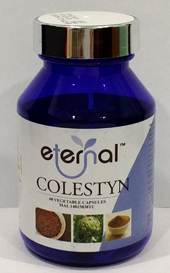
Colestyn : Comprises a mixture of Red Yeast Rice, Artichoke Leaf Extract and Guggul Extract.
Red Yeast Rice
What is Red Yeast Rice?
- A substance which is extracted from rice
- Fermented with a type of yeast called Monascus purpureus
History
Red Yeast Rice has been used in China and other Asian countries as a traditional medicine. According to MayoClinic, the use of red yeast rice in China was first documented in the Tang Dynasty in 800 A.D. A detailed description of its manufacture is found in the ancient Chinese pharmacopoeia, Ben Cao Gang Mu-Dan Shi Bu Yi, published during the Ming Dynasty (1368-1644). In this text, red yeast rice is proposed to be a mild aid for gastric problems such as indigestion and diarrhea, blood circulation, and spleen and stomach health.
It's also used as a food colouring, additive, and preservative.
What are the benefits of Red Yeast Rice?
- Lowers cholesterol
- Aids Digestion
- Enhances Blood Circulation
- Diabetes Treatment
- Pain Relief
It contains several compounds collectively known as monacolins, particularly monacolins K, known to lower cholesterol by prohibiting the production of HMG-CoA reductase.
Some modern prescription drugs, such as the statin drugs (eg: lovastatin, simvastatin) are cholesterol-reducing drugs that contains monacolins derivatives.
HMG-CoA reductase is the sticky part of cholesterol. It sticks to the inside of blood vessels, and often results in blockage leading to stroke or heart attack.
Red yeast rice has been under human studies since the 1970s in the U.S., with results that show lower triglyceride, or bad cholesterol, levels in the blood. There is no determination of long-term effects, according to Medline Plus of the National Institutes of Health.
Red Yeast Rice also contains sterols, isoflavones, and monounsaturated fatty acids, or "healthy fats".
Generations of Chinese have taken red yeast rice to soothe upset stomach, diarrhea and indigestion, states the Mayo Clinic. The product is popular in acupuncture therapy for spleen, liver and large intestine or colon health, states Dr. John Chen, PhD, writing for "Acupuncture Today" in his article, Red Yeast Rice: Rediscovery of an Ancient Herb. However, this is not a recommended supplement for those with acute liver disease.
Improved circulation of blood is one of the potential benefits of taking red yeast rice, though there have been no in-depth studies conducted to prove this claim, according to Medline Plus of the National Institutes of Health.
There are some claims that red yeast rice may provide benefits to those with diabetes, states Medline Plus of the National Institutes of Health. However, the department recommends further studies to determine its effectiveness.
When combined with a variety of herbs such as Yan Hu Suo, also known as rhizoma corydalis, or Hong Hua, known as flos carthami, red yeast rice may offer pain relief from injury or trauma, according to Dr. John Chen, PhD, in a 2004 article in "Acupuncture Today."
Red Yeast Rice Found to Help Colon Health
By Greg Arnold, DC, CSCS, October 28, 2009, abstracted from "Anticancer effects of Chinese red yeast rice versus monacolin K alone on colon cancer cells" in the July 2008 issue of the Journal of Nutritional Biochemistry. Greg Arnold is a Chiropractic Physician practicing in Danville, CA.
A 2008 lab study (4) suggests that red yeast rice may also help maintain colon health.
Colorectal cancer is the second leading cause of death from cancer (behind lung cancer) in the United States, claiming more than 55,000 Americans each year and posing a risk for an estimated 1 in 4 Americans (80 to 90 million) (5).
In the study, researchers exposed two colon cancer cell lines (HCT-116 and HT-29) to red yeast rice doses ranging from 0 to 300 microgram/milliliter for 48 hours as well as red yeast rice free of a component called monacolin K in doses ranging from 0 to 100 micrograms/milliliter for 48 hours.
The researchers found that by the end of 48 hours, both samples of red yeast rice with (with and without monacolin K) significantly stopped growth of the colon cancer cells. Specifically, 50 micrograms/milliliter of red yeast rice with monacolin k reduced tumor cell growth by 41% and 32% in HCT-116 and HT-29 cells, respectively. Red yeast rice without monacolin K reduced tumor growth in the HCT-116 (at 50 micrograms/milliliter) and HT-29 (at 100 microgram/milliliter) by 25% and 20%, respectively.
Artichoke
What is Artichoke?
- The globe artichoke (Cynara scolymus), also called "French artichoke" and "green artichoke", derive its common name from the northern Italian words articiocco andarticoclos. This latter term is supposed to come from the Ligurian word cocali,meaning a pine cone.
- The artichoke is a perennial in the thistle group of the sunflower family and is believed to be a native of the Mediterranean and the Canary Islands.
- They are available twelve months a year with the peak season in the spring and fall. There are more than 140 artichoke varieties but less than 40 are grown commercially. Today most artichokes grown worldwide are cultivated in France, Italy, and Spain, while California provides nearly 100 percent of the United States crop.
- Artichokes are one of the oldest foods know to humans
Benefits of Artichoke
- Cholesterol Fighter
- Digestive Health
- Liver Function
- Cancer Prevention
High cholesterol is associated with an increased risk for coronary heart disease and atherosclerosis. Artichokes and artichoke leaf extract reduce cholesterol levels. The efforts to study this idea date back all the way to the 1970s, when scientists began examining cynarin and cholesterol in their labs.
In a 12-week, double-blind study, 75 patients received placebo or 1,280 mg standardized artichoke leaf daily. At the end of the 12 weeks, the treated group recorded a modest reduction in total cholesterol of 4.2%.
To further demonstrate the artichoke's heart-healthy powers, scientists set up a randomized, placebo-controlled study to examine the effect of artichoke leaf extract in patients with high cholesterol. All participants showed positive results. Over 6 weeks, participants were split up, with half receiving artichoke extract and the rest a placebo. The patients receiving artichoke were shown to have an 18.5% reduction in cholesterol level.
The high concentration of cynarin in artichokes not only affects cholesterol, but also can contribute to aiding in digestive health. Cynarin is known to stimulate the production of bile, which enables us to digest fats and absorb vitamins from our food, making artichokes an excellent way to start any meal.
Studies have shown that artichoke leaf extract can be very helpful for people suffering from irritable bowel syndrome (IBS) and dyspepsia, or upset stomachs. In a study done at the University of Reading in the United Kingdom, 208 adults who suffered from IBS and dyspepsia were monitored over a two-month period of intervention with artichoke leaf extract. Results showed a 26.4% reduction in IBS incidence among the participants at the end of the trial. A significant shift of self-reported bowel patterns away from "alternating constipation/diarrhoea" toward "normal" was observed as well. Dyspepsia symptoms also decreased by 41% after treatment, and in general, the participants noted a 20% increase in quality of life after treatment.
The boost in bile production you gain from eating artichokes can also be attributed to cynarin, which can be very beneficial to the health of your liver. The bile that your liver produces helps to remove dangerous toxins and digest fats. Artichokes also contain the flavonoid silymarin, a powerful liver protectant. Silymarin averts the process of lipid peroxidation from occurring in the cell membranes of the tissues of the liver, making the artichoke an ideal weapon in your arsenal to help you obtain optimal liver function
There are many other powerful polyphenol-type antioxidants found in artichokes that researchers believe can contribute to the prevention and management of prostate cancer, breast cancer, and leukemia. Studies have shown that the antioxidants rutin, quercetin, and gallic acid found in artichoke leaf extract are able to induce apoptosis (cell death) and reduce the proliferation of cancer cells.
In research done at Comenius University in Slovakia, artichoke leaf extract was studied for its ability to inhibit growth of leukemia cells. Over a 24-hour period, leukemia cells were treated with a variety of concentrations of artichoke leaf extract, with results suggesting that it exerts an antiproliferative activity on leukemia cells while inducing apoptosis of these cells as well.9 In addition, researchers at the University of Georg-August in Germany have said that the many phytochemicals in artichokes help to block the secretion of cancer agents, thus inhibiting the angiogenesis related to cancer.
Recommended Dosage
The recommended dose of artichoke leaf extract has not been clearly established. Unlike medications, for which the standard doses have been well established in carefully designed studies, there is less information available for determining the best dose for most herbal supplements, including artichoke leaf extract. With both prescription and non-prescription medications, researchers establish the most effective and safest doses in special studies, known as dose-range studies. These studies are done early in the development of medications, long before they are ever approved. Suggested regimen would be 320 to 640 mg of artichoke leaf extract three times a day. For treating high cholesterol, studies have used doses of 1800 to 1920 mg total per day (split up into two or three smaller doses throughout the day).
Guggulipid Extract
What is Guggul Extract?
- Herbal remedy made from the Commiphora mukul tree, also known as the mukul myrrh tree.
- The yellowish resin in the tree has been used for thousands of years in traditional Ayurvedic medicine in India to treat a wide variety of health problems and diseases.
Uses and Benefits of Guggul: (to mention few of its many functions)
- Has strong disinfecting properties.
- A weight loss and fat burning agent.
- It lowers elevated serum cholesterol and triglycerides, while maintaining or improving the HDL to LDL ratio.
- Increases white blood cells count and reduces the risk of coronary artery disease.
- Guggul was historically used to treat a condition called medoroga, a disease similar to the modern atherosclerosis.
- Research concluded that it increases the production of thyroid hormone. Since this hormone breaks down cells of protein, fat and carbohydrates, this herb is believed to be promoting weight loss.
- Anti-inflammatory and pain-relieving herb by many Indian herbal doctors.
- Beneficial in arthritic pains and aids in reversing the degenerative changes that occur in joints and bones.
- Widely used in diseases like rheumatoid arthritis, gout, osteoarthritis, sciatica, paralysis, hemiplegia, lymphadenopathy, etc.
- Widely used in skin diseases as a blood purifier.
- Assists in promoting the production of red blood corpuscles (RBC) and improving the action of white blood corpuscles (WBC).
- Aids in improving the digestive system
- Ease secretion of digestive juices
- Functions as an appetizer and avoids indigestion and constipation.
- Beneficial in hemorrhoids and colitis and relieves from hyperacidity and belching.
- Regular use of guggul helps in improving sexual ability, sperm count and sperm quality.
- Helps in treating leprosy and eczema. Its extract also helps in fighting tumors.
- Useful in menstrual disturbances and painful menses.
Available Formulation
Colestyn 380mg in vegetable capsule (60cap/bottle) which comprises of
- Red Yeast Rice - 200mg
- Artichoke - 130mg
- Guggul Extract - 50mg





